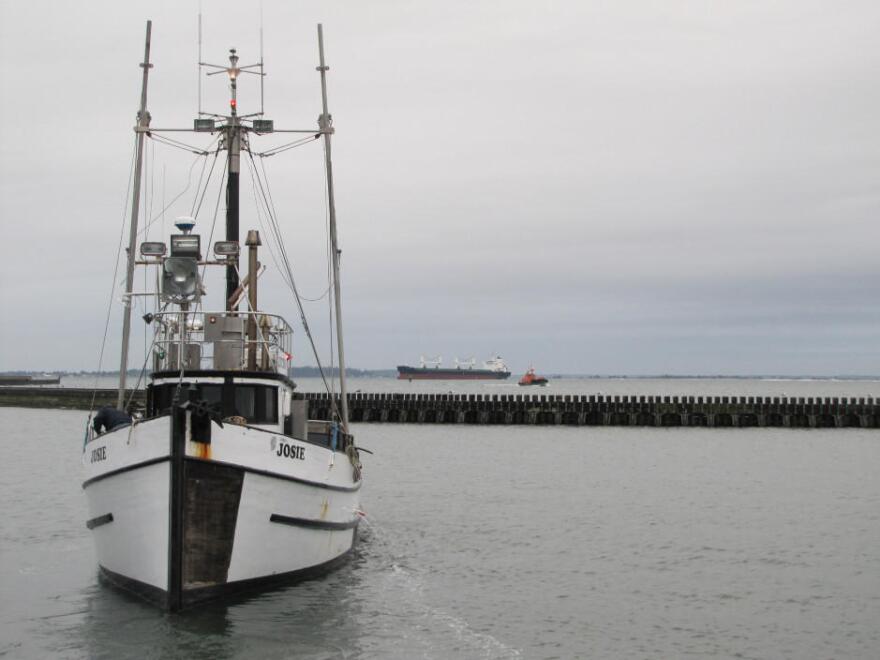Oil companies in North Dakota are looking for the fastest and cheapest way to get their product to refineries, and they've set their sights on moving more of their product by rail to the Northwest.
There are six new oil terminals proposed for Washington state. Half of them could be built in the small communities around Grays Harbor, a bay on the Pacific coast about 50 miles north of the mouth of the Columbia River.
Al Carter has lived in Grays Harbor County pretty much his whole life. He served as a county commissioner for eight years. He's pro-development and pro-business. When he was in office he called himself an "infrastructure guy."
"Sewer, water, roads ... those are infrastructure things in a community that makes a community grow," Carter says. "If you build those things, then people will come to those places.
He wants to see more businesses set up shop in Grays Harbor County, which has an unemployment rate of 10.6 percent, more than four percentage points higher than the state average. The county has struggled since the lumber industry contracted in the 1970s and 1980s.
Carter isn't against oil coming through his community; for him, it's an issue of balance and scale.
Three oil terminals are proposed to be built in Grays Harbor. At maximum capacity, more than 700 ships and barges would come in and out each year, while eight or more trains would roll through town each day, delivering oil to those ships.
"For me, the biggest thing is, I don't think any one thing should dominate the whole landscape. That much oil — all we're going to be is an oil terminal," Carter says. "Nothing else is going to come here, nobody else is going to want to come here. There won't be any room for anything else."
In the short term, constructing the terminals would create hundreds of jobs. Longer term, according to research from the oil companies, the terminals would lead to about 150 jobs.
Paul Queary is a spokesperson for Westway Terminals and Imperium Renewables, two of the three companies that want to build here, which say they are committed to the highest levels of public safety and environmental protection.
"They will help support the existing refinery jobs elsewhere in Washington, and they will bring domestically produced oil to U.S. refineries and help increase U.S. energy independence," Queary says.
Environmentalists say the terminals proposed for the Northwest aren't just being built to move oil to U.S. refineries — they also could export crude from the Canadian oil sands. Right now, it's illegal to export U.S. crude oil.
Oil prices have been dropping, but industry experts say that more infrastructure — including pipelines, railroads and terminals — still are needed to catch up with the North American oil boom.
"The Northwest is the most likely market for Bakken crude or North Dakota crude to go to," says Tom Kloza, an energy analyst for Oil Price Information Service.
He says that as the Northwest gets less oil from Alaska, refineries here need to make up the difference with North Dakota crude.

"Whether it's the most hospitable is going to depend on the way the local communities and regulators looked at the environmental consequences," Kloza says.
The Quinault Indian Nation takes up the northwestern corner of the county, and about one-fifth of the tribe's 2,900 members make their living from fishing and crabbing.
They unload freshly caught salmon, Dungeness crab and razor clams at their docks at the mouth of Grays Harbor, and are worried about what an oil train derailment or a ship accident could do to their way of life.
The Quinault have joined with the local fishing industry groups and environmentalists in opposition to the Grays Harbor oil terminals, but Fawn Sharp, president of the tribe, says the Quinault aren't anti-jobs.
"We're simply anti making shortsighted, narrow decisions," Sharp says. "Let's look at the science, let's look at the history and culture of the impacts, and make a good public policy decision."
She sees the oil terminals as a symptom of a much bigger problem that threatens her people: climate change. Last year, the ocean flooded into the Quinault's tribal village, forcing a state of emergency. The glacier that used to feed the Quinault River is gone.
State agencies are in the process of conducting the environmental review for the terminals.
Copyright 2021 KUOW. To see more, visit KUOW. 9(MDA5NTM4MTIyMDE0MTg3NDc2MTVlZjdmNQ001))


